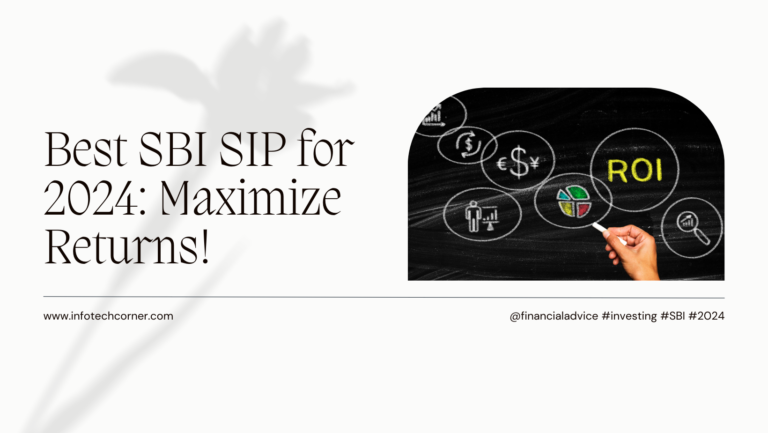Introduction
Are you looking to maximize your investment returns in 2024? If so, considering the best SBI SIP for 2024 might be a game-changer for your financial goals. SBI (State Bank of India) offers a plethora of Systematic Investment Plans (SIPs) that cater to various risk appetites and investment horizons. In this article, we’ll dive deep into the top-performing SBI SIPs, helping you make an informed decision.

Understanding SIP (Systematic Investment Plan)
A SIP, or Systematic Investment Plan, is an investment strategy where you invest a fixed amount of money regularly in a mutual fund. It allows you to buy units of the mutual fund on a specified date each month, thus spreading your investment over time.
Investing in SIPs comes with several advantages. Firstly,
SIPs instill a sense of financial discipline, as they require regular contributions. Secondly, they offer the benefit of rupee cost averaging, which means you buy more units when prices are low and fewer units when prices are high. Lastly, SIPs are convenient and flexible, allowing you to start with a small amount and increase your investment over time.
Why Choose SBI for SIP Investments?
- Overview of SBI’s Financial Strength
SBI is India’s largest and most trusted bank. Its strong financial standing and vast network make it a reliable choice for investors. With SBI, you can be assured of safety and security in your investments.
- SBI’s Reputation in Mutual Funds
SBI Mutual Fund is one of the leading fund houses in India. It offers a wide range of mutual funds that cater to different investment needs.
SBI’s mutual funds are known for their robust performance and professional fund management.
Criteria for Selecting the Best SBI SIP for 2024
When choosing the best SBI SIP for 2024,
examining the past performance of the funds is crucial. Look for funds that have consistently delivered high returns over the years.
Your risk tolerance is another critical factor. Some funds may offer high returns but come with higher risks.
Evaluate your risk appetite before making a decision.
Consider your investment horizon. Are you investing for the short term or long term?
Long-term investments typically yield better returns with SIPs.
Top SBI SIPs for 2024
OverviewThe SBI Bluechip Fund is a large-cap fund that invests in blue-chip companies with a proven track record. It aims to provide long-term capital appreciation by investing in companies with robust fundamentals.
Returns and PerformanceThe SBI Bluechip Fund has consistently delivered strong returns.
In the past five years, it has provided an average annual return of around 15%, making it a reliable choice for investors seeking stable growth.
OverviewThe SBI Small Cap Fund focuses on investing in small-cap companies. These companies have the potential for high growth but come with higher volatility.
Returns and PerformanceThe SBI Small Cap Fund has been a top performer in the small-cap category.
It has delivered impressive returns, averaging around 20% annually over the past five years.
OverviewThe SBI Magnum Multicap Fund invests across large-cap, mid-cap, and small-cap stocks. This diversification helps in reducing risk while aiming for substantial returns.
Returns and PerformanceThis fund has shown strong performance, with
an average annual return of about 18% over the last five years. It’s ideal for investors looking for a balanced approach.
 Overview
OverviewThe SBI Equity Hybrid Fund is a balanced fund that invests in both equity and debt instruments. This blend helps in managing risk while providing growth opportunities.
Returns and PerformanceWith an average annual return of 12% over the past five years,
the SBI Equity Hybrid Fund is suitable for investors seeking moderate risk and stable returns.
Expert Insights on SBI SIPs
Financial Advisor OpinionsMany financial advisors recommend SBI SIPs for their
consistent performance and the bank’s solid reputation. Advisors often suggest diversifying investments across different SBI funds to balance risk and reward.
Market Analyst ViewsMarket analysts also have a positive outlook on SBI SIPs. They highlight
SBI’s robust fund management team and strategic investment choices as key factors driving the success of these SIPs.
How to Start Investing in SBI SIPs
Opening an AccountTo start investing in SBI SIPs, you need to open an account with SBI Mutual Fund. This can be done online or by visiting an SBI branch.
The process is straightforward and requires basic KYC documentation.
Choosing the Right SIPSelecting the right SIP involves assessing your financial goals, risk tolerance, and investment horizon.
Consult with a financial advisor if needed to make an informed choice.
Tips to Maximize Your SIP Returns
Regular MonitoringKeep an eye on your SIP investments regularly.
Monitoring helps in making timely decisions and adjustments based on market conditions.
DiversificationDiversifying your SIP investments across different funds can help in minimizing risk.
Don’t put all your eggs in one basket.
Long-Term PerspectiveSIPs are best suited for long-term investments.
Stay invested for at least 5-10 years to reap maximum benefits.
Conclusion
Choosing the best SBI SIP for 2024 can significantly enhance your investment returns. With options like the SBI Bluechip Fund, SBI Small Cap Fund, SBI Magnum Multicap Fund, and SBI Equity Hybrid Fund, there is something for every type of investor. Remember to consider factors such as past performance, risk tolerance, and investment horizon when making your choice. Start your investment journey with SBI SIPs today and watch your wealth grow.
FAQs
- What is the minimum investment amount for SBI SIPs?
The minimum investment amount for SBI SIPs typically starts at ₹500 per month, making it accessible for investors with varying budgets.
2. How can I track the performance of my SIP?You can track the performance of your SIP through the SBI Mutual Fund website, mobile app, or by logging into your investment account online.
3. Can I change my SIP amount after starting?Yes, you can change your SIP amount after starting. Most fund houses, including SBI, allow you to modify the SIP amount as per your financial situation.
4. What happens if I miss an SIP payment?Missing an SIP payment occasionally is not a major issue. However, consistent missed payments might lead to the termination of your SIP. It’s best to inform your bank in advance if you foresee any payment issues.
5. Are there any tax benefits for investing in SBI SIPs?Yes, investments in certain SBI SIPs, particularly ELSS (Equity Linked Savings Scheme) funds, offer tax benefits under Section 80C of the Income Tax Act, 1961.
Like this:
Like Loading...
Related post






hiI like your writing so much share we be in contact more approximately your article on AOL I need a specialist in this area to resolve my problem Maybe that is you Looking ahead to see you